Our dogs are family to us; they are involved in almost every part of our lives, they share the good and the bad with us, they are our best friends.
But is there something they cannot share with us, or rather, the other way around – we can’t share with them? What food from our fridge can our furry friends eat safely?
Most owners have wondered this at some point or another. In fact, most of us wonder about it daily. So, you’re not the odd one out, don’t worry.
Well, the truth is that dogs shouldn’t consume most human foods since our digestive systems function differently. You and your pooch aren’t able to digest food the same way.
However, some certain ingredients and groceries are safe for dogs – and, as it turns out, pretty beneficial, as well.
So, what can dogs eat?
We’re here to tell you all about that with this comprehensive list of all the foods that dogs can safely consume, as well as brief descriptions of those foods and how beneficial they are for them.
Ready to learn more about your pup’s diet? Let’s get into it, then!

Mind The Trap
Like we’ve said previously, there are human foods that are, indeed, safe for canine consumption. However, you shouldn’t take this information and run with it.
It’s easy to get excited when you find out that you can share your favorite snack with your beloved dog – but don’t let that excitement cloud your judgment.
Before you allow your doggo to indulge in some of these dog-safe foods, you should know this: Your pup shouldn’t have any of them in abundance, but rather from time to time and as a snack.
Don’t forget that there are also differences between certain dog breeds and their genetic predispositions, so while some breeds are OK having some of these foods, others will be better off without them.
Generally speaking, if you want to introduce your four-legged friend to some new foods, you should have a chat with your vet and see what they think about it. They know your dog and know what foods may cause an upset stomach – or some other adverse reaction.
This way, you’ll save your dog the unnecessary discomfort and yourself the stress and worry caused by their bad reaction to a new food.
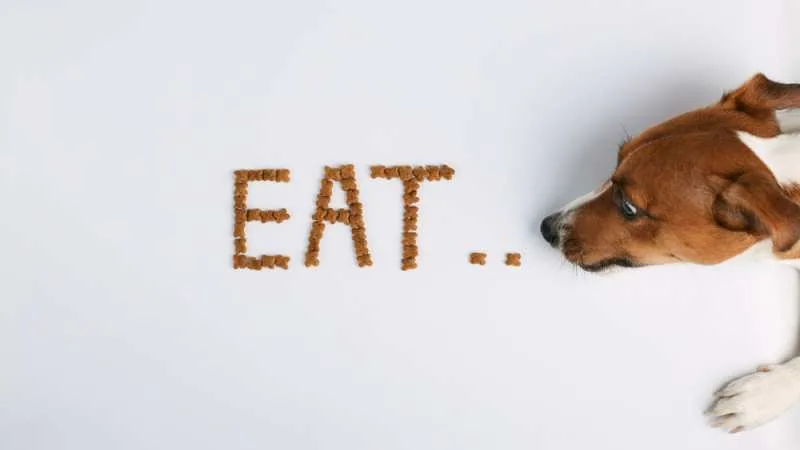
Human Foods Dogs Can Eat
Okay, in this list, we’re going to tell you what foods your pooch can enjoy from your dinner table – not literally, of course, “wink, wink” – and we’ve sorted them into groups to make it easier to follow.
It’s going to be quite a long list, so get comfortable!
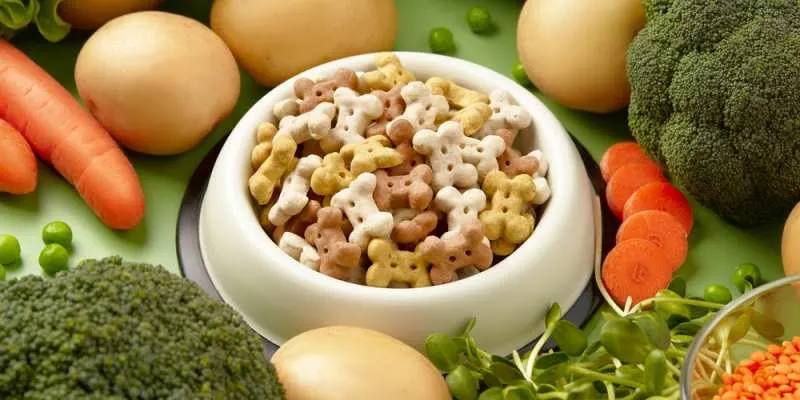
Veggies
Even though we may find them boring and sometimes only eat them because we know they are healthy for us, surprisingly or not, dogs can see vegetables as a tasty snack.
Here are some veggies that our doggos can feast on – and even reap some benefits!
Carrots
You might enjoy eating them with hummus or dipping them into your favorite Ranch dressing. What about your dog, though?
Even though our doggos can’t enjoy them that way, they can still be a healthy addition to their everyday diet.
As you may know, carrots are full of beta-carotene, which is fantastic for your pet’s immunity, as well as their skin and coat quality. And much like our bodies, dogs’ bodies convert beta-carotene into vitamin A – which is extremely important for eyesight.
Additionally, they’re low in calories and high in fiber, so you won’t have to worry about your pup gaining weight because of this crunchy addition to their diet.
Green Beans
Admit it; green beans probably aren’t the first veggie you would consider when deciding which vegetables your dog can eat – but they certainly can be beneficial.
Whether you choose to feed them to your dog raw, steamed, or canned, green beans can be fantastic for your furry friend. They contain loads of healthy nutrients, as well as vitamins and minerals.
However, always make sure that they are sodium-free – or at least low in sodium content – especially when we’re talking canned green beans.
Celery
Celery is another one of those veggies that we enjoy eating with dressings and sauces that are actually good for dogs, too.
Celery is a terrific choice for your dog for many reasons, starting with the fact that it’s packed with vitamins A, C, and K, potassium, manganese, and folate. It’s low-fat and low-calorie, so it’s considered a great diet snack for all of the obese dogs out there.
Also, celery contains nutrients that help promote heart health and even fight cancer – talk about superfoods, huh?
And, as a bonus for all of us dog owners:
It can help deal with that doggie breath (admit it, even though you love your dog to death, it’s triggered your gag reflex at least once).
Broccoli
Broccoli isn’t one in the celery’s category of “fantastic for dogs” foods, but it can still be given to dogs on certain occasions as a treat.
It’s high in fiber and low in fat, and it also contains loads of vitamin C. However, broccoli florets have isothiocyanates which can be responsible for mild (and in some cases severe) gastric irritation in dogs.
On the other hand, broccoli stalks can potentially be a choking hazard since they could cause an obstruction in the esophagus.
Still, if cut into smaller pieces, broccoli can serve as a nice snack for your dog every once in a while.
Peas
Most of what we’ve said about green beans goes for peas, as well. Green, snow, sugar snap, garden, or English are all ok for dogs – fresh or frozen. They have several vitamins and minerals and are rich in protein and fiber.
Just to reiterate, watch the sodium content if you’re giving your dog canned beans.
Brussel Sprouts
Much like the previous veggies we’ve mentioned, Brussel sprouts are rich in all of the valuable nutrients, vitamins, and minerals – with the addition of antioxidants, which are great for both dogs and humans.
A huge warning here, though!
If you overfeed them to your dog, opening all of your windows might not be enough to give you a breath of non-smelly air. If you haven’t figured it out – they can cause significant gas.
Hold your breath and run!
Cabbage
Pretty similar to brussels sprouts, cabbage can be beneficial for dogs in small amounts – but any more than that, and your pup might turn into a gas-producing machine for the day.
Spinach
Even though dogs can technically eat spinach, it’s not a veggie that we would put at the top of this list.
While it does contain some excellent nutrients, it also contains oxalic acid, which blocks the body’s ability to absorb calcium and could even lead to kidney damage – with prolonged and excess consumption, that is.
Now, while your dog would probably have to consume large amounts for that to happen, just to be safe, we would recommend you to choose another veggie as your puppy’s snack.
Cucumbers
Here’s another low-calorie, vitamin-rich snack coming your way! Cucumbers are packed with vitamin K and don’t have many calories, so even overweight dogs can enjoy them.
Aside from that, they are very hydrating, so you can use them to refresh your doggo on hot summer days in a more exciting – and crunchier – way than plain old water. Although, of course, a bowl of freshwater is always a must!
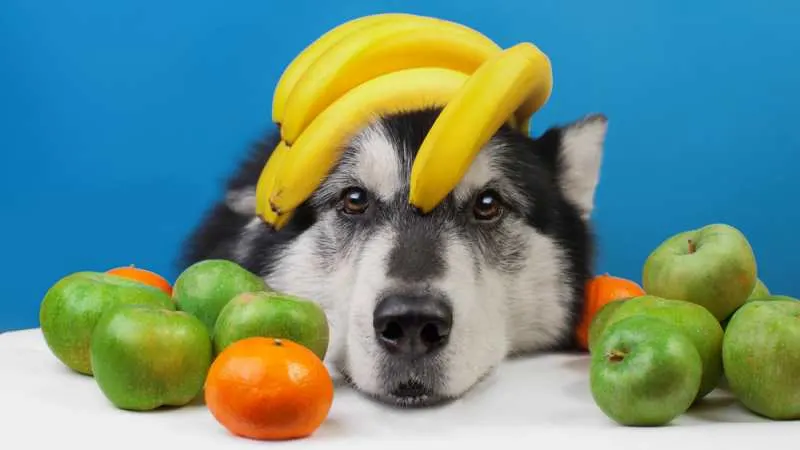
Fruits
Now, onto the more tricky part of this list – fruits.
Why “tricky,” you might be asking?
Well, fruits usually contain a lot of sugar which we know isn’t suitable for dogs. And while that sugar found in fruit isn’t the same as the one in chocolate and other candy and sweets, it’s still sugar.
Furthermore, most seeds in fruits contain cyanide – which is toxic to both dogs and humans. So, you must be extra careful to avoid your dog getting its paws on them accidentally.
That’s why we need to be wary when we feed fruit to our dogs and only do it in small amounts – and not very frequently.
With that said, let’s get to the list!
Watermelon
Yup, your favorite summer treat is safe for your pupper, as well! Both of you can have some delicious, juicy watermelon on a hot summer day to cool down.
That’s fantastic news, right?
Aside from its irresistible flavor and refreshing powers, watermelon is full of potassium, and vitamins A, B-6, and C,
Also, it’s 96% water – and what better way for your pet to boost its hydration in the heat than a tasty watermelon treat (rhyme intended)!
However, make sure that when you give a slice to your pup, you remove all the seeds along with the rind, as they can cause intestinal blockage.
Strawberries
Another summer staple that is safe for our doggos to eat – strawberries! Like most fruits and veggies, strawberries are packed with fiber and vitamin C.
In addition to that, they also contain an enzyme that could even whiten your pup’s teeth! But, don’t get your hopes up – for that to happen, they would have to eat a lot of strawberries, which they definitely shouldn’t.
As you know, they are very sweet, so they should only be given in moderation – ideally paired with another treat to add a new flavor.
Raspberries
The favorite of many, these little berries are a delight under the summer sun. But, can our dogs enjoy their wonders too?
The answer is yes – but again, in moderation.
While they contain less sugar than strawberries, for example, they also have small amounts of xylitol, which can be toxic to dogs. So, don’t let them indulge too much.
On the other hand, they contain antioxidants, high in fiber, vitamin C, and manganese. They’re also low in sugar and calories – so, they’re a safe choice for obese dogs, as well.
They also have anti-inflammatory properties, which makes them great for senior dogs since it helps aging joints.
Pears
Perhaps not as popular – but no less tasty and beneficial for our four-legged friends – we have pears.
They are high in fiber (surprise, surprise), vitamins C and K, as well as copper. Some even suggest that you can reduce the risk of getting a stroke by 50% by eating this fruit – and you’ll be glad to know that the same goes for dogs!
Before allowing your dog to feast on this delicious fruit, take out the pit and the seeds (we’ve mentioned the cyanide) and cut them into tiny cubes to make it easier to digest since we all know dogs aren’t famous for their patience, careful chewing.
Pineapple
Another tremendous – but occasional – treat for dogs is pineapple. As long as you have taken of the skin and the crown, you can give your dogs a cube or two from time to time, and they will probably love it!
One highly beneficial thing about pineapple is that it contains bromelain, an enzyme that makes the dog’s body absorb proteins easier. How great is that?
Bananas
Bananas are a sweet fruit that many consider their favorite – and, well, they can become your dog’s favorite, too!
Bananas are safe for dogs to eat – but again, in small quantities.
They abound in many beneficial nutrients, potassium, fiber, copper, biotin, and so on, and they are also low in cholesterol and sodium.
However, bananas do have high sugar content, so they definitely shouldn’t be a staple part of your dog’s diet. Instead, make bananas an occasional treat when they have been a particularly good boy or girl.
Be sure to remove the peel, though!
Mangos
Continuing with the theme of exotic fruits, we’d like to talk about mangos. Yes, dogs can eat mangos.
They are rich in vitamins A, B6, C, and E and potassium, and alpha and beta-carotene (which, as we’ve discussed, is excellent for eyesight).
They have high sugar content, though, so use it as a treat every once in a while – no more than that. And, just to be safe, we’ll remind you to remove the pit first because of the cyanide – and because it can be a choking hazard.
Oranges
Oranges aren’t as popular amongst dog owners – perhaps because they’re not very popular amongst dogs, either.
Dogs aren’t fans of strong citrus smells, so they probably won’t even be too interested in having a bite of your orange. And yes, that also applies to tangerines, grapefruits, and lemons.
However, if your dog likes it, you should know that it has many nutrients – including Vitamin C, potassium, and fiber.
No different from other fruits, you should keep the peel for your DIY projects and let them have the juicy flesh of the orange – minus any seeds, of course.
Apples
Apples are a terrific source of vitamins A and C, along with fiber. They are low in protein and fat, which means they are suitable for obese and senior dogs, too. On that note, you can try feeding your old doggo some applesauce instead of raw apples; it’ll be easier on their teeth.
But, before you feed them to your dog, remove the pit, seeds, and peel!
Blueberries
Blueberries are a great bite-sized treat for both dogs and dog owners; they pack many benefits for general health.
They are rich in fiber, phytochemicals, as well as in antioxidants which prevent cell damage – superfood material, right?
Again, don’t overdo it. Too much of a good thing – as you know – could eventually become bad. Oh, and speaking of berries, your doggo can eat blackberries, too!

Fish
When we think of fish and pets, most of us probably think of cats. But are they the only ones that love to consume it – or can their sworn enemies of the animal kingdom do the same?
Well, they can – sort of, that is.
The thing is that fish can be tricky even for humans – and for several reasons, too. For starters, some of it can contain high levels of mercury or bones that can sneak their way into a bite. Last but not least, there’s the issue of the way it’s prepared.
But, generally speaking, fish can be very beneficial for dogs.
Here’s why:
Fish is high in protein and omega-3 fatty acids which can have anti-inflammatory benefits. Fish can serve as an alternative source of protein for dogs that have an allergy to chicken, for example.
Don’t feed your dog raw fish, though, since it can carry harmful bacteria such as salmonella and listeria, which can be extremely dangerous for dogs and humans alike.
Also, be wary of the amounts of fish you allow your dog to eat since some of them (salmon, for example) have a high-fat content. Consuming more significant amounts of these types of fish can lead your doggo to obesity – which we certainly don’t want.
Best Types Of Fish For Dogs
Vets say that the best kinds of fish are short-lived, such as salmon, herring, walleye, ocean and lake whitefish, and Arctic char.
The reason long-lived fish, as opposed to short-lived, is not an ideal choice is that the heavy metals that build up in the fish’s system can lead to heavy metal toxicity.
So, instead of opting for tuna or swordfish, choose one of the short-lived types of fish to preserve your peace of mind.
Speaking of seafood, it’s safe to treat your pup to some shrimp every once in a while!
Related Read: Can Dogs Eat Tuna Fish? Is Tuna Bad For Dogs?
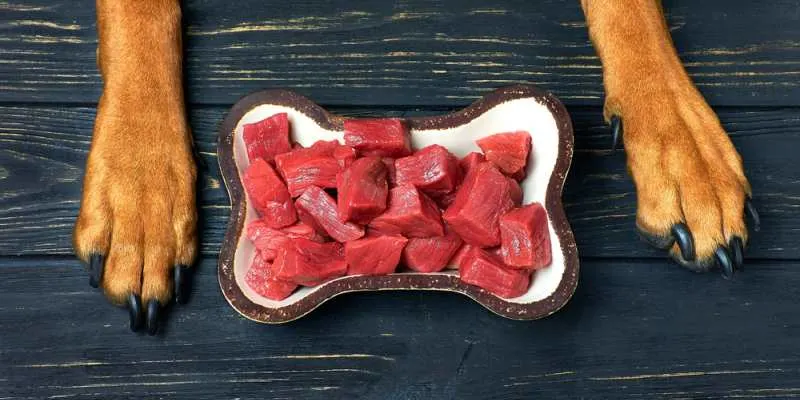
Meat
Meat is probably the most obvious type of food that your dogs can eat. While most people consider them carnivores, dogs are, in fact, omnivores since they can survive eating other foods, as well.
With that said, dogs do primarily eat meat – and that is their primary protein source.
Certain meats are more popular among dog owners; some are more suitable for those doggies with a more sensitive stomach – while others are not suitable for dogs with certain health conditions.
But generally speaking, chicken, pork, beef, and turkey meat are all safe choices.
Chicken
The most popular choice of meat for dogs is chicken – and for a very good reason, too. It doesn’t contain lots of fat, it’s a great source of protein, and it’s packed with nutrients that support healthy skin, bones, and coats.
Steak And Beef
Red meats contain beneficial fatty acids that help maintain joint support and muscle tone. So, yes, your pup can – and should – eat beef, as long as it’s properly cooked.
Turkey
Turkey meat is pretty similar to chicken in the sense that it’s lean meat and a great source of protein – without much fat. It’s also perfect for supporting and maintaining muscle, which is essential for pups in development and senior dogs alike.
One of the rare downsides is that it can be a little pricy. So, some people might opt for the more affordable option – chicken.

Special Mention: Peanut Butter
We’ve all seen the adorable videos of dogs licking peanut butter while getting a bath or taking meds. And, we cannot argue; it is a great distractor.
But, as it turns out, it’s also a great source of protein and healthy calories for your dog.
However, don’t forget to check the label for sodium and xylitol, which can be toxic to dogs. Lately, some brands have switched to using it as a sugar substitute – and while it’s harmless to humans, it could be deadly to dogs.
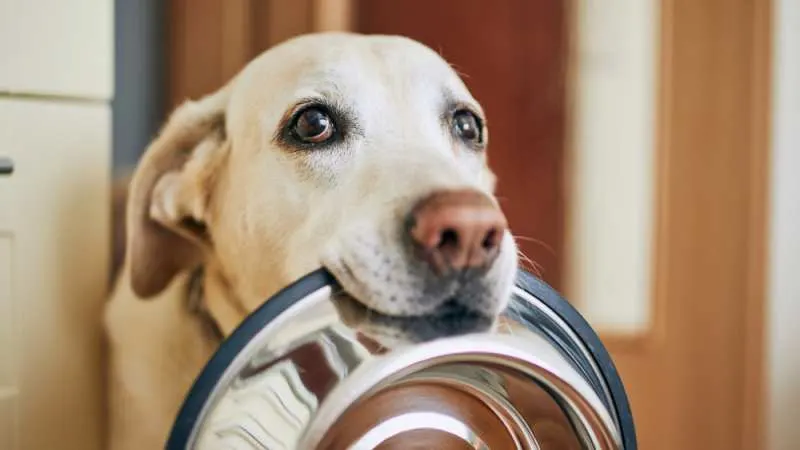
Conclusion
There are plenty of foods that we humans get to enjoy every day. It’s only normal that, as pet parents, we wonder, “What can dogs eat?” from time to time. We all want the same thing – to share our favorite food with them.
Well, there isn’t a formula as to how you can know if a food is safe for dogs, other than doing some research or speaking to your vet. That way, you’ll be sure that your dog will safely enjoy the new treats – without worrying if they will harm them.
In this article, we’ve given you a list of foods that your dog can safely eat, as well as tips on how to make the most of the food’s benefits without causing a bad reaction.
Veggies can be a terrific addition to your dog’s diet – either as a treat, or a part of their daily meals, depending on the vegetable. Some veggies need to be cooked, while others can be fed to dogs raw so that they can enjoy the crunchiness.
The most important thing is that you look out for the sodium content with canned veggies – and avoid them if there is any salt. Fresh is pretty much always the best.
Fruits are also a great source of nutrients, but they contain sugar, so you need to be careful with them. They should never be a daily food – but rather an occasional treat.
Some fruits, like apples, are safe to consume more frequently because they are low-sugar and low-calorie – but still packed with nutrients.
Fish can be a great addition to your pet’s diet, but watch out for the longer-lived species, as they contain higher levels of mercury – which could be toxic. Also, don’t overdo it with fattier fish like salmon.
Fish can also substitute conventional protein sources if your dog has developed a sensitivity to them.
Meat is obviously a safe bet – but be wary of the fat content and smaller bones in some types of meat.
Peanut butter is a popular grocery list item and can serve you greatly in making homemade treats for dogs. But as with most processed foods, be careful regarding how much of it you give to your dog because it’s a high-calorie food.
Well, that’s it from us. We’ll leave you and your beloved doggo to (responsibly) enjoy some new flavors together – and discover new favorite foods!
Have fun!

